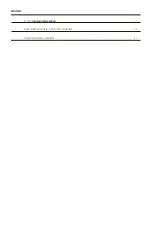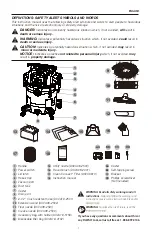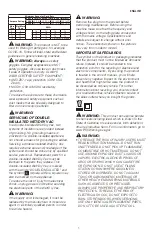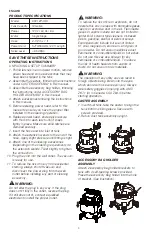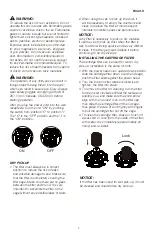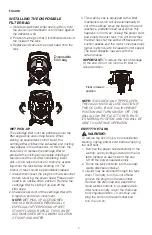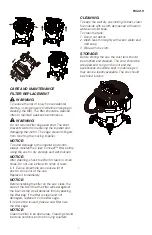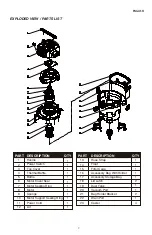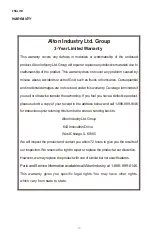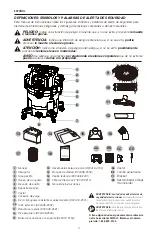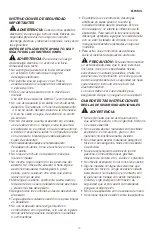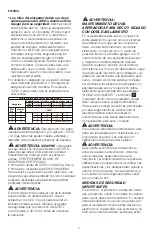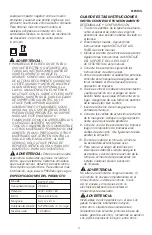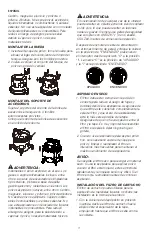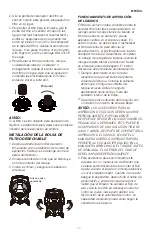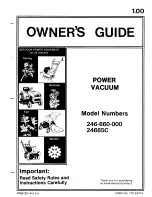
ENGLISH
WARNING:
WARNING:
To reduce the risk of electric
shock. Do not expose to rain. Store indoors.
• Do not leave the appliance when it is connected
to a power source. Unplug it from outlet when
not in use and before servicing.
• Do not allow the appliance to be used as a toy.
Pay close attention when the appliance is used
by or near children.
• Use this appliance ONLY as described in the
manual. Use only D
E
WALT recommended
attachments.
• Do not use this appliance with a damaged cord or
plug. If the appliance is not working correctly, or if
it has been dropped, damaged, left outdoors, or
dropped in water, return it to a service center.
• Do not pull or carry this appliance by the cord, use
the cord as a handle, close a door on the cord, or
pull the cord around sharp edges or corners. Do
not run the appliance over the cord. Keep cord
away from heated surfaces.
• Do not unplug this appliance by pulling on the
cord. To unplug, grasp the plug, not the cord.
• Do not handle the plug or appliance with wet hands.
• Do not put any objects into the openings of the
appliance. Do not use the appliance with any
opening blocked; keep free of dust, lint, hair and
anything else that may reduce air flow.
• Keep hair, loose clothing, fingers, and all body
parts away from the openings and moving parts.
• Turn off all controls before unplugging appliance.
• Take extra care when cleaning on stairs.
• Do not use the appliance to pick up flammable or
combustible liquids, such as gasoline, or use in
areas where flammable or combustible liquids
are present.
• Static shocks are possible in dry areas or when
the relative humidity of the air is low. This is only
temporary and does not affect the use of the
vacuum. To reduce the frequency of static shocks,
add moisture to the air with a console, installed
humidifier or use anti-static hose
(standard on some models).
• To avoid spontaneous combustion, empty the dust
tank after each use.
• Do not pick up anything that is burning or
smoking, such as cigarettes, matches, or
hot ashes.
• Do not use to vacuum combustible explosive
materials, such as coal, grain, or other finely
divided combustible materials.
• Do not use to vacuum hazardous, toxic or
carcinogenic materials, such as asbestos or
pesticide.
• Never pick up explosive liquids (e.g. gasoline,
diesel fuel, heating oil, paint thinner, etc.),
acids or solvents.
• Do not use vacuum without filters in place.
• Some wood contains preservatives which
can be toxic. Take extra care to prevent
inhalation and skin contact when working
with these materials. Request and follow
any safety information available from the
material supplier.
• Do not use vacuum as a step ladder.
• Do not place heavy objects on vacuum.
•
An extension cord must have adequate
wire size (AWG or American Wire Gauge)
for safety.
The smaller the gauge number of
the wire, the greater the capacity of the cable,
that is 16 gauge has more capacity than
18 gauge. An undersized cord will cause a
drop in line voltage resulting in loss of power
and overheating. When using more than one
extension to make up the total length, be sure
each individual extension cord contains at least
the minimum wire size. The following table
shows the correct size to use. If in doubt, use
the next heavier gauge. The smaller the gauge
number, the heavier the cord.
• If an extension cord is to be used outdoors it
must be marked with the suffix W-A or W
following the cord type designation.
For example – SJTW-A indicates it is
acceptable for outdoor use.
When using electrical appliances,
IMPORTANT SAFETY INSTRUCTIONS
SAVE THESE INSTRUCTIONS
BEFORE USING THIS APPLIANCE, READ AND
FOLLOW ALL INSTRUCTIONS.
ADDITIONAL SAFETY RULES
WARNING:
2
always follow basic safety precautions to reduce
the risk of fire, electric shock and personal injury,
including the following:
CAUTION:
This appliance is not
they do not play with appliance.
Children should be supervised to ensure that
their safety.
of the appliance by a person responsible for
supervision or instruction concerning use
knowledge, unless they have been given
capabilities, or lack of experience and
with reduced physical, sensory or mental
intended for use by people (including children)


